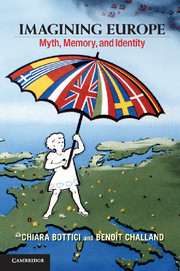Conclusion
Published online by Cambridge University Press: 05 July 2013
Summary
We began this book by stating that Europe has not always been there. We want to conclude it by observing that, despite this fact, we have nevertheless been imagining it for quite some time. We need, therefore, to assume a critical reading of Europe that avoids the traps both of an essentialist and a nihilist reading. Otherwise stated, the fact that Europe is the result of the different ways in which it has been imagined over time does not mean that it does not exist. Although in the first part of this book we concentrated on the role that practices of collective remembrance played in the construction of a sense of belonging and common identity, in the second part, we explored moments when such practices turned into effective sites for the work on myth.
Myth and history are two distinct things. An account of the past can leave us completely indifferent and cannot, therefore, ever gain the emotional charge needed to turn narratives into myth. This does not mean that historical narratives are unable to generate a sense of belonging to a common polity. The narrative of Europe born out of the Second World War has, for instance, proved capable of generating a feeling of identification in certain contexts, but it has rarely assumed the features of a geographically spread full-fledged myth. This may be because no strong Other is available for such narratives to refer to – if we omit the Other of what the Europeans have been. To paraphrase Giesen (2004), we may say that this is due to the fact that the narrative of “Europe born out of the war” displays more the prosaic story of an identity built on the ruins of a catastrophe than the poetry of an identity based on triumph.
- Type
- Chapter
- Information
- Imagining EuropeMyth, Memory, and Identity, pp. 167 - 178Publisher: Cambridge University PressPrint publication year: 2013



